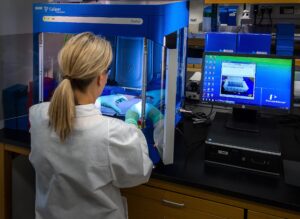
Artificial Intelligence (AI) has become an integral part of our lives, permeating various sectors and transforming the way we interact with technology. One of the most significant areas where AI has made a profound impact is in the development of AI devices. These intelligent devices leverage the power of AI algorithms and machine learning to enhance functionality, improve efficiency, and provide a more personalized user experience.
AI devices encompass a wide range of products, from smartphones and smart speakers to smart home appliances and wearable technology. These devices are equipped with advanced sensors, voice recognition capabilities, and powerful AI processors that enable them to understand and respond to user commands, adapt to individual preferences, and make autonomous decisions.
The Impact of AI Devices: Transforming Industries and Enhancing Experiences
In the realm of smartphones, AI has revolutionized the way we use our mobile devices. From voice-activated virtual assistants like Siri and Google Assistant to AI-powered cameras and facial recognition systems, smartphones have become more intuitive and capable than ever before. AI algorithms analyze user behavior, learn from patterns, and provide personalized recommendations for apps, content, and services. Additionally, AI-powered cameras can optimize settings in real-time, enhancing image quality, and enabling features like portrait mode and augmented reality filters.
Smart speakers, another prominent AI device category, have gained widespread popularity in recent years. Devices like Amazon Echo and Google Nest leverage AI to provide voice-controlled smart home automation, music streaming, weather updates, and much more. These devices use natural language processing and machine learning to understand and respond to user queries, enabling seamless interactions and a hands-free user experience.
Wearable technology, including smartwatches and fitness trackers, has also embraced AI. These devices go beyond simply tracking steps and monitoring heart rate. With AI integration, they can analyze data from multiple sensors, provide personalized health insights, and even detect potential health issues. AI algorithms can learn from user patterns and make proactive suggestions for physical activity, sleep optimization, and stress management. Moreover, AI-powered wearables can seamlessly sync with smartphones, allowing users to receive notifications, control music playback, and even make payments from their wrists.

In the realm of smart home technology, AI devices have transformed houses into intelligent living spaces. AI-powered virtual assistants like Amazon’s Alexa and Google Assistant can control smart home devices, such as lights, thermostats, and security systems, through voice commands. These devices learn user preferences over time, adapting to individual routines and providing a more personalized home automation experience. With AI at the helm, smart homes have become more efficient, secure, and convenient.
AI devices have also found applications in the healthcare sector. From AI-powered diagnostic tools to remote patient monitoring devices, AI is revolutionizing healthcare delivery. AI algorithms can analyze medical data, such as lab results and imaging scans, to assist in accurate diagnoses. Remote patient monitoring devices equipped with AI can track vital signs, detect abnormalities, and alert healthcare professionals in real-time, enabling proactive interventions and improving patient outcomes.
In the automotive industry, AI devices are shaping the future of transportation. AI-powered self-driving cars are equipped with advanced sensors, computer vision, and machine learning algorithms that enable them to navigate roads, detect obstacles, and make autonomous driving decisions. These devices have the potential to revolutionize transportation by enhancing road safety, reducing congestion, and improving overall efficiency.
While AI devices offer remarkable benefits, they also present certain challenges. Privacy and security concerns arise due to the vast amount of personal data collected and processed by these devices. Safeguarding user information and ensuring robust security measures are crucial to maintain user trust. Additionally, ethical considerations surrounding AI decision-making and transparency need to be addressed to ensure fairness, accountability, and the prevention of bias.
Here are a few unique points about AI devices:
- AI-Powered Fashion: AI devices are now being integrated into the fashion industry, offering personalized style recommendations and virtual wardrobe management. AI algorithms analyze individual fashion preferences, body measurements, and current trends to suggest outfits, accessories, and even provide virtual try-on experiences.
- Emotional Intelligence: Some AI devices are incorporating emotional intelligence capabilities, enabling them to understand and respond to human emotions. These devices can recognize facial expressions, tone of voice, and other cues to provide empathetic responses, personalized recommendations, and emotional support.
- AI in Agriculture: AI devices are being utilized in agriculture to optimize farming practices and improve crop yields. AI-powered sensors can monitor soil conditions, weather patterns, and plant health, providing real-time data and insights for precision farming, irrigation management, and pest control.
- AI Assistants for the Elderly: AI devices are playing a significant role in providing companionship and assistance to the elderly. AI-powered robots and virtual assistants can perform tasks such as medication reminders, emergency alerts, and provide entertainment, reducing loneliness and improving the quality of life for seniors.
- AI in Art and Creativity: AI devices are being employed in the field of art and creativity. AI algorithms can generate original artwork, compose music, and even write poetry. Artists and creators are using AI as a tool to enhance their creative process, explore new possibilities, and push the boundaries of traditional art forms.
- AI in Sports: AI devices are being used in sports to analyze player performance, provide real-time coaching feedback, and enhance training programs. AI algorithms can track and analyze athlete movements, detect patterns, and suggest improvements, leading to better athletic performance and injury prevention.
- AI Devices for People with Disabilities: AI devices are making a significant impact on the lives of people with disabilities. From AI-powered prosthetics that adapt to user movements to devices that assist with speech recognition and communication, AI technology is enabling greater independence and accessibility for individuals with disabilities.
- AI in Music Creation: AI devices are being employed in the music industry to compose and generate music. AI algorithms can analyze musical patterns, styles, and genres to create original compositions or provide musical accompaniment for artists, expanding creative possibilities and collaboration.
- AI Devices for Sustainable Living: AI devices are contributing to sustainable living by optimizing energy usage, monitoring environmental conditions, and promoting eco-friendly practices. Smart home devices equipped with AI algorithms can automatically adjust energy consumption based on user behavior and optimize resource utilization, contributing to energy efficiency and conservation.
- AI in Personalized Education: AI devices are revolutionizing education by providing personalized learning experiences. AI-powered tutoring systems can adapt to individual student needs, identify learning gaps, and provide tailored feedback and recommendations, enhancing the effectiveness and accessibility of education.





